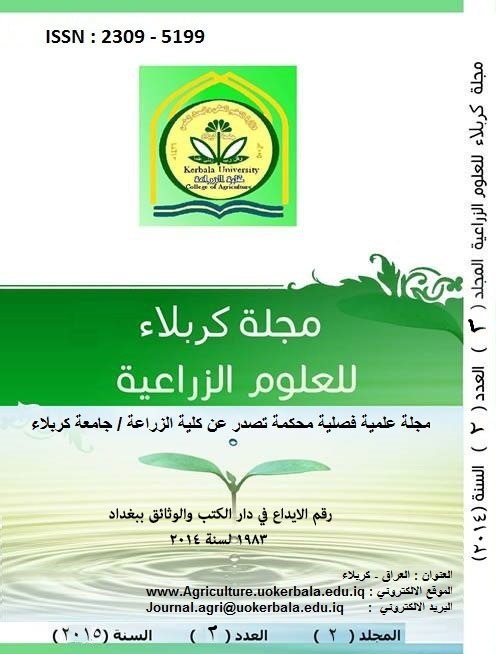Abundance of bacterial and fungal community after amendments of organic residues in some soils from Babylon province
DOI:
https://doi.org/10.59658/jkas.v2i2.495Keywords:
مخلفات عضوية , نشاط الاحياء المجهرية, وفرة البكتريا والفطريات , كاربون عضويAbstract
This study was conducted in the fields of the agriculture college, AL-Qasim Green University to monitor microbial activity, bacterial and fungal communities and organic carbon after the application of organic residues to the soil. Different composition of organic residues were added (wheat straw) and (alfalfa) at two levels (0.5%) and (1%) for both types of residues in pots incubated for 45 days to measure bacterial and fungal community and organic carbon. Soils samples were further incubated for 52, 59 and 66 days for monitoring microbial activity with time. Results showed that the addition of wheat straw 1% caused a significant increase in the microbial activity and bacterial abundance compared with the control treatment. Results indicated also that the microbial activity and bacterial abundance were different according to the organic composition. The addition of wheat straw at 0.5% resulted in a significant increase in the microbial activity and bacterial abundance compared with the alfalfa 0.5%. Results proved also that the abundance of fungi in the soil was higher at the attendance of wheat straw 0.5% and 1% compared with the alfalfa 0.5%, 1% and the control treatment. Organic carbon was higher at the addition of wheat straw 0.5% and 1% compared with the alfalfa 0.5%, 1%. The high percentage of carbon after addition of wheat straw was accompanied by high fungi abundance. This outcome was confirmed by a highly significant relationship (r= 0.78, p value = 0.001) between organic carbon and fungi abundance. It is appeared that the tolerance of fungi to the drought conditions was higher than bacteria. In conclusion, the addition of wheat straw 1% may be considered as an important source for supplementing the microbial energy in the long term and its implications for crop production. The study also concluded that the fungi were more tolerant to the drought conditions than bacteria and it’s related to the decomposition of organic residues under the drought conditions.
Downloads
Published
How to Cite
Issue
Section
License
Copyright (c) 2015 Copyright (c) 2024 is the Author's article. Published by the Journal of Kerbala for Agricultural Sciences under a CC BY 4.0 license

This work is licensed under a Creative Commons Attribution 4.0 International License.
Licensing Terms
All articles are published under a Creative Commons License and will be directed to the Creative Commons Attribution 4.0 International License (CC BY 4.0) That permits use, distribution, and reproduction in any medium, provided the original work is properly cited. This license also allows the work to be used for commercial purposes.
Use by both non-commercial and commercial users
This content is licensed under a Creative Commons Attribution 4.0 International (CC BY 4.0) license, permitting use by both non-commercial and commercial users. Individual users may access, download, copy, display, and redistribute the articles to colleagues, as well as adapt, translate, and text- and data-mine the content, subject to the following conditions:
- The author's moral rights, including the right of attribution and the right to protect their work from derogatory treatment, are respected.
- Where content in the article is identified as belonging to a third party, users must ensure that any reuse complies with the copyright policies of the owner of that content.
- If the article content is reused for research or educational purposes, users should maintain a link to the appropriate bibliographic citation, including the DOI and a link to the published version on the journal's website.






